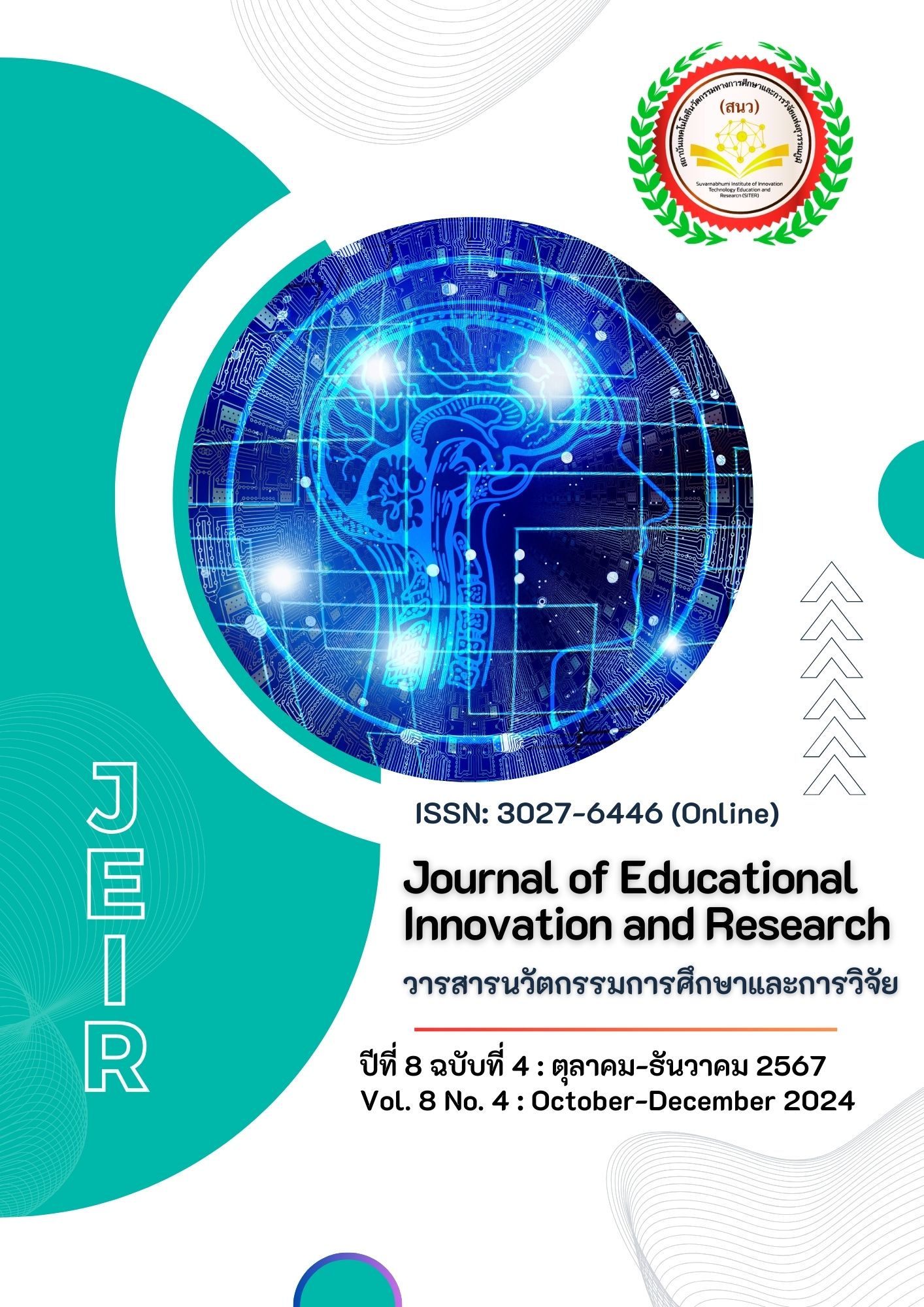การพัฒนาสมรรถนะในการพัฒนานวัตกรรมการจัดการเรียนรู้ในศตวรรษที่ 21 ของครูคณิตศาสตร์ โดยใช้รูปแบบการนิเทศแบบร่วมพัฒนาวิชาชีพ
Main Article Content
บทคัดย่อ
การวิจัยครั้งนี้มีความมุ่งหมายเพื่อสร้างและพัฒนา หาคุณภาพของคู่มือนิเทศ : การพัฒนานวัตกรรมการจัดการเรียนรู้ในศตวรรษที่ 21 ของครูคณิตศาสตร์ โดยใช้รูปแบบการนิเทศแบบร่วมพัฒนาวิชาชีพ เพื่อศึกษาผลการพัฒนาสมรรถนะในการพัฒนานวัตกรรมการจัดการเรียนรู้ในศตวรรษที่ 21 ของครูคณิตศาสตร์ จากการใช้รูปแบบการนิเทศแบบร่วมพัฒนาวิชาชีพ และเพื่อศึกษาความพึงพอใจของครูคณิตศาสตร์ที่มีต่อรูปแบบการนิเทศแบบร่วมพัฒนาวิชาชีพ กลุ่มตัวอย่าง ได้แก่ ครูคณิตศาสตร์ ของสถานศึกษาในสังกัดสำนักงานเขตพื้นที่การศึกษาประถมศึกษาร้อยเอ็ด เขต 3 ที่ปฏิบัติการสอนในปีการศึกษา 2563 – 2564 และเป็นสมาชิกชมรมครูคณิตศาสตร์ สำนักงานเขตพื้นที่การศึกษาประถมศึกษาร้อยเอ็ด เขต 3 ซึ่งได้มาด้วยการเลือกแบบเจาะจง (Purposive Sampling) จากผู้ที่สมัครใจร่วมพัฒนานวัตกรรมการจัดการเรียนรู้ในศตวรรษที่ 21 ของครูคณิตศาสตร์ จำนวน 30 คน เครื่องมือที่ใช้ในการวิจัย ได้แก่ 1) คู่มือนิเทศ : การพัฒนานวัตกรรมการจัดการเรียนรู้ในศตวรรษที่ 21 ของครูคณิตศาสตร์ โดยใช้รูปแบบการนิเทศแบบร่วมพัฒนาวิชาชีพ 2) แบบทดสอบวัดความรู้ความเข้าใจเกี่ยวกับการพัฒนานวัตกรรมการจัดการเรียนรู้ในศตวรรษที่ 21 ของครูคณิตศาสตร์ 3) แบบประเมิน และเกณฑ์การประเมินนวัตกรรมการจัดการเรียนรู้ในศตวรรษที่ 21 ของครูคณิตศาสตร์ 4) แบบประเมินความมุ่งมั่นในการพัฒนานวัตกรรมการจัดการเรียนรู้ในศตวรรษที่ 21 ของครูคณิตศาสตร์ และ 5) แบบสอบถามความพึงพอใจของครูคณิตศาสตร์ที่มีต่อรูปแบบการนิเทศแบบร่วมพัฒนาวิชาชีพ วิธีการวิเคราะห์ข้อมูล ใช้วิธีวิเคราะห์เนื้อหา (Content Analysis) ค่าร้อยละ ค่าเฉลี่ย ส่วนเบี่ยงเบนมาตรฐาน ค่าดัชนีความสอดคล้องจากผู้เชี่ยวชาญ ค่าความยากง่าย ค่าอำนาจจำแนก ค่าความเชื่อมั่นของแบบทดสอบ ผลการวิจัยพบว่า
1. ผลการสร้างและพัฒนา หาคุณภาพของคู่มือนิเทศ : การพัฒนานวัตกรรมการจัดการเรียนรู้ในศตวรรษที่ 21 ของครูคณิตศาสตร์ โดยใช้รูปแบบการนิเทศแบบร่วมพัฒนาวิชาชีพ พบว่า ผู้เชี่ยวชาญมีความคิดเห็นเกี่ยวกับความถูกต้องเหมาะสมของคู่มือนิเทศ : การพัฒนานวัตกรรมการจัดการเรียนรู้ในศตวรรษที่ 21 ของครูคณิตศาสตร์ โดยใช้รูปแบบการนิเทศแบบร่วมพัฒนาวิชาชีพ โดยรวม อยู่ในระดับมากที่สุด เมื่อพิจารณาเป็นรายด้านพบว่า มีคุณภาพอยู่ในระดับมากที่สุดทุกด้าน
2. ผลการพัฒนาสมรรถนะในการพัฒนานวัตกรรมการจัดการเรียนรู้ในศตวรรษที่ 21 ของครูคณิตศาสตร์ จากการใช้รูปแบบการนิเทศแบบร่วมพัฒนาวิชาชีพ ด้านความรู้ความเข้าใจเกี่ยวกับการพัฒนานวัตกรรมการจัดการเรียนรู้ในศตวรรษที่ 21 ของครูคณิตศาสตร์ พบว่า ครูคณิตศาสตร์ที่ได้รับการพัฒนา จำนวน 30 คน มีค่าเฉลี่ยของคะแนนทดสอบวัดความรู้ความเข้าใจหลังการพัฒนาสูงกว่าก่อนการพัฒนาอย่างมีนัยสำคัญทางสถิติที่ระดับ .01 ด้านความสามารถในการพัฒนานวัตกรรมการจัดการเรียนรู้ในศตวรรษที่ 21 ของครูคณิตศาสตร์ โดยใช้รูปแบบการนิเทศแบบร่วมพัฒนาวิชาชีพ พบว่า ครูคณิตศาสตร์มีสมรรถนะด้านความสามารถในการพัฒนานวัตกรรมการจัดการเรียนรู้จากการดำเนินงานพัฒนาสมรรถนะในการพัฒนานวัตกรรมการจัดการเรียนรู้ในศตวรรษที่ 21 โดยใช้รูปแบบการนิเทศแบบร่วมพัฒนาวิชาชีพ โดยรวม อยู่ในระดับดีมาก เมื่อพิจารณาเป็นรายด้านพบว่า มีคุณภาพอยู่ในระดับดีมากเป็นส่วนใหญ่ ด้านความมุ่งมั่นในการพัฒนานวัตกรรมการจัดการเรียนรู้ในศตวรรษที่ 21 ของครูคณิตศาสตร์ โดยใช้รูปแบบการนิเทศแบบร่วมพัฒนาวิชาชีพ พบว่า ครูคณิตศาสตร์มีสมรรถนะด้านความมุ่งมั่นในการพัฒนานวัตกรรมการจัดการเรียนรู้จากการดำเนินงานพัฒนาสมรรถนะในการพัฒนานวัตกรรมการจัดการเรียนรู้ในศตวรรษที่ 21 โดยใช้รูปแบบการนิเทศแบบร่วมพัฒนาวิชาชีพ โดยรวม อยู่ในระดับดี เมื่อพิจารณาเป็นรายข้อพบว่า มีคุณภาพอยู่ในระดับดีทุกข้อ
3. ผลการศึกษาความพึงพอใจของครูคณิตศาสตร์ที่มีต่อรูปแบบการนิเทศแบบร่วมพัฒนาวิชาชีพ พบว่า ครูคณิตศาสตร์มีความพึงพอใจต่อการดำเนินงานพัฒนาสมรรถนะในการพัฒนานวัตกรรมการจัดการเรียนรู้ในศตวรรษที่ 21 โดยใช้รูปแบบการนิเทศแบบร่วมพัฒนาวิชาชีพ โดยรวม อยู่ในระดับมากที่สุด เมื่อพิจารณาเป็นรายด้านพบว่า มีความพึงพอใจอยู่ในระดับมากที่สุดทุกด้าน
Article Details

อนุญาตภายใต้เงื่อนไข Creative Commons Attribution-NonCommercial-NoDerivatives 4.0 International License.
เอกสารอ้างอิง
Boonliang, T. (2013). Developing innovative teaching and learning for 21st century education. Chulalongkorn University Press.
Glatthorn, A. A. (1984). Curriculum leadership: Development and implementation. Harper & Row.
Keerati, Y. (2009). Learning management for developing thinking skills. Chulalongkorn University Press.
Kuratko, D. F. (2012). Entrepreneurship: Theory, process, practice. (9th ed.). South-Western Cengage Learning.
Lynch, M. (2012). The handbook of Asian Englishes. Wiley-Blackwell.
McClelland, D. C. (1970). The achieving society. The Free Press.
Natchanok, P. (2020). Learner-centered learning management. Office of the Basic Education Commission.
Orasa, K. (2012). Developing critical thinking skills for learners. Office of the Basic Education Commission.
Pakin, S. (2006). Developing educational innovations for learning. Ramkhamhaeng University Press.
Sakkachai, B. (2004). Curriculum development for effective learning. Office of the Basic Education Commission.
Schumpeter, J. A. (2010). Capitalism, socialism and democracy. Harper Perennial Modern Classics.
Vicharn, P. (2013). Teachers for students in the 21st century. Sodsri-Saritwong Foundation.
Wachira, K. (2015). Developing teaching and learning through analytical thinking. Chulalongkorn University Press.
Watchara, L. (2010). Developing thinking and learning skills. Office of the Basic Education Commission.
Yaowapa, D. (1999). Developing the thinking process. Chulalongkorn University Press.


